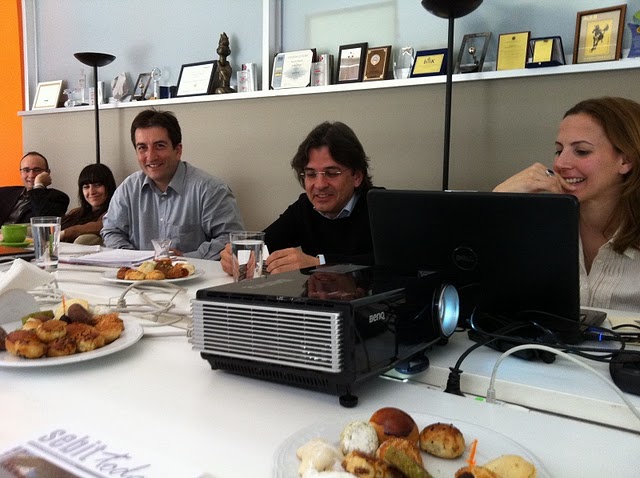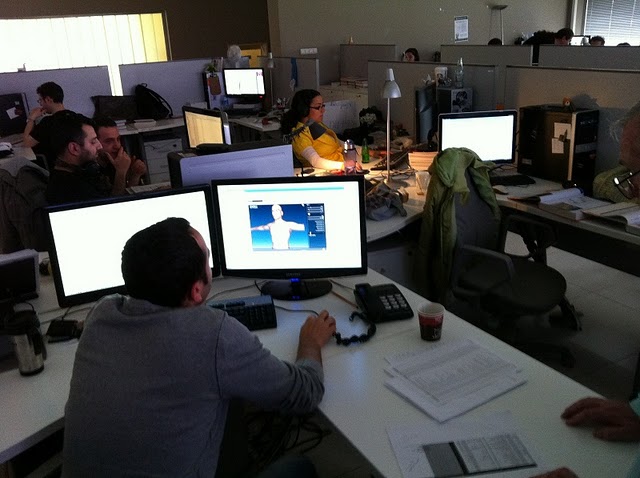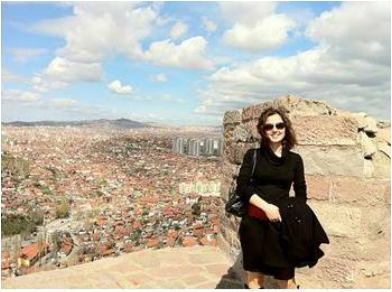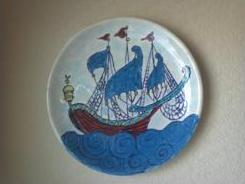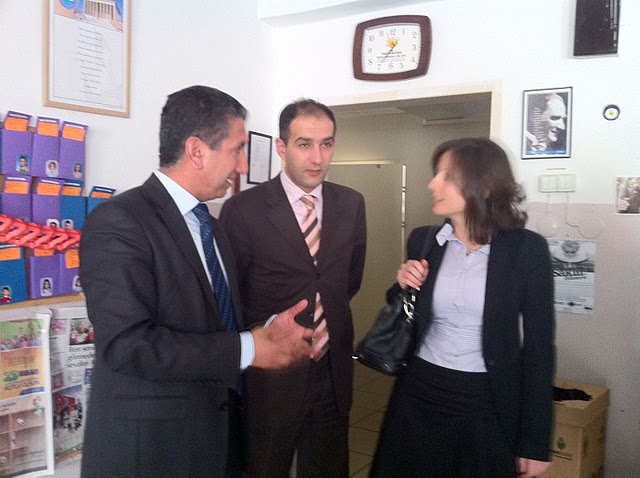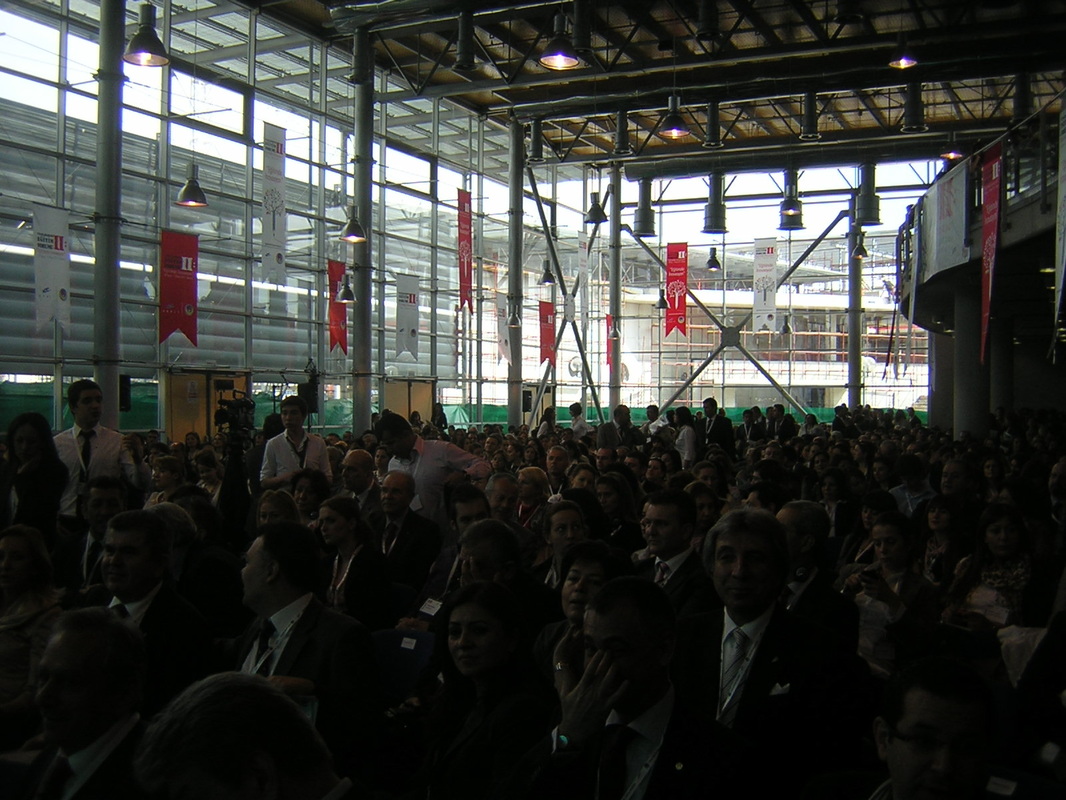Turkish Education Association Conference - April 2011
Traveling to Turkey and presenting at this conference was one of the highlights of my career and life. Below is a brief essay expressing my thoughts about education and lessons we can learn from Turkey. The founder of the Republic of Turkey, Mustafa Kemal Atatürk, once said that "teachers are the one and only people who save nations". He was right; and the United States in particular should take some lessons from the commitment of the Turkish people to education.
Also, be sure to visit this link to see more photos and videos from Turkey, from the five daily calls to prayer, to shopping in Beypazari (an ancient little town on the old silk and spice trade route), to the schools we visited and the conference.
Also, be sure to visit this link to see more photos and videos from Turkey, from the five daily calls to prayer, to shopping in Beypazari (an ancient little town on the old silk and spice trade route), to the schools we visited and the conference.
Teachers Are the One and Only People Who Save Nations – a lesson from Turkey
International Education Forum: Innovation in Education
|
Two brief snippets from my presentation. Click here to view my full presentation.
|
Anne Shaw is interviewed by Turkish reporter from Al Jazeera.
|
Educators in the United States could learn some things from Turkish educators. When we were in Turkey recently I had the opportunity to visit four schools, public and private, K-12.

I had been invited by the Turkish Education Association, known in Turkish as Türk Eğitim Derneği, or TED to speak at the Innovation and Education Forum. I was honored to receive the personal invitation to present from Dr. Emin Karip, the Deputy Chair of Turkey’s National Board of Education. The Turkish Education Association (TED) and Sebit Education and Information Technology Inc. in cooperation with Ankara TED College produced the 2nd annual International Education Forum II based on the theme of “Innovation in Education.” The event was opened with remarks by Presidential Secretary General Mustafa Isen.
I was especially excited about meeting and lunching with Sugata Mitra, famous for his “Hole in the Wall” project which began in India and was the inspiration for the award-winning film, Slumdog Millionaire. I greatly looked forward to his presentation at the conference, which begins with some introductions in Turkish by Burcu Esmersoy, General Moderator and Dr. Umran İnan, President of Koç University.
|
|
|
We also had an opportunity to meet and talk over lunch with Dr. Şenştürk Uzun, Deputy Governor of Ankara. My visit with him was cut short by being called to an interview with a reporter. Part of her experience, which was very impressive, included working for Al Jazeera. We also greatly enjoyed meeting Dr. Umran İnan, President of Koç University, and his wife.
Sebit
The conference was sponsored by Sebit, a multinational e-education solution provider focusing on the empowerment of learners and educators K-12 through the effective use of technology. Based in Ankara, Turkey, this company entered the American market in 2007 with its product Adaptive Curriculum.
Sebit CEO Ahmet Eti and his project team hosted a meeting with two of the conference presenters, Thomas Frey and his wife, Deb as well as my husband, Jerry Self and me. After some discussion and enjoyment of the host’s Turkish coffee and pastries, Mr. Eti then took us on an extensive tour of Sebit where we were able to observe their beautiful facilities and speak with their extremely talented, interdisciplinary team of designers who create the Object Lessons for Adaptive Curriculum. We were very impressed with the facility, the people working there, and the very comfortable, attractive and positive atmosphere.
The Adaptive Curriculum product is excellent as it fits perfectly into not only personalized learning (aka Differentiated Instruction), it completely integrates into and supports 21st century, project-based learning, and it is a very high quality, online, interactive product which students will enjoy using. Additionally, these math and science lessons have been aligned to the state standards in the USA.
The Adaptive Curriculum product is excellent as it fits perfectly into not only personalized learning (aka Differentiated Instruction), it completely integrates into and supports 21st century, project-based learning, and it is a very high quality, online, interactive product which students will enjoy using. Additionally, these math and science lessons have been aligned to the state standards in the USA.
Turkish Hospitality
TED and Sebit kindly offered to extend our visit beyond the conference in order to allow us to have some time to see the sights. I inquired as to whether it would be possible to visit some of their schools; I wanted to meet the teachers and the students, and to see them in action. They arranged for us to be driven to four schools along with representatives from TED who served as guides, historians, and when needed, translators. Many thanks to Gözde Oztürk and Hande Haciömeroğlu, who enthusiastically took us to Beypazari (a famous, ancient town along the old silk and spice trade route), shopping, to museums, to lunches and dinners, to schools, to the Ankara Castle and to the TED conference. We were astounded at the levels of hospitality in Turkey; we felt as though we were literally being treated like royalty.
|
Anne and one of our guides, Hande, who took us to Beypazari. Photo by Deb Frey.
|
Gözde spent many days taking us to schools, the conference, and the Ankara Castle. Photo by Deb Frey.
|
Additionally we received a number of beautiful gifts from the Turkish Education Association. See more on the PPT for Maya Koleji below (click on the chess set).
The Schools
|
Left to right: Riza Öktem, Levent Okut and Gözde Oztürk. Photo by Deb Frey.
|
We visited, and were hosted by the principals from four schools. The first school we visited was Maya Koleji, for grades K-8. The Educational Coordinator, Levent Okut, greeted us with Turkish coffee and tea. We then proceeded to tour one of the most spectacular campuses I have ever seen.
The artwork of the students and teachers was everywhere. The library and cafeteria were stunning. They had a beautiful, state of the art, auditorium. In addition to art, there was a room with 8 pianos. There was a great deal of evidence that project-based learning was alive and well. We saw evidence of projects and research on topics ranging from the atom bomb to chocolate and to environmental issues. At the end of our tour we returned to the “lounge” to discover that a wonderful luncheon had been planned, and we enjoyed it very much. The Principal, Sema Bayram and assistant principals, Fatma Kusat and Anil Erac, were equally hospitable. |
|
|
Mr. Okut then accompanied us to Suleyman Elementary School, a public school, where we met the principal, Riza Öktem, and were once again greeted with enthusiasm and hospitality, beginning with Turkish coffee and tea. We then toured the campus, visiting a number of classrooms. Again, music and art were very much a part of the curriculum. Mr. Öktem also showed us the garden the students were growing!
|
Watch the video below taken at Maya Koleji Elementary - we loved what this music teacher and this piano did here. Then view this slideshow to see the amazing facilities at Maya Koleji Elementary!
|
|
|
Beautiful and delicious Turkish coffee (left) and Chi (tea on the right) was a delight for us when served at Suleyman Elementary!
Challenges in Turkish Schools
Not all schools in Turkey have the advantages of the schools we toured. However, the point is that the Republic of Turkey is firmly determined to raise the quality of education for its children – significantly.
One of the most passionate presentations at the TED conference was by Mete Kizilkaya, Principal at Polis Amca Primary School in Ankara. The teachers are all escorted to and from school in police cars, so the school has come to be known as the Uncle Police School. Many of the students do not attend school very much; they are busy making money to help their family. He showcased, and had a video of a boy about 8 or 10 years old, speaking to him about his life. He rises early every morning, goes out and purchases bagels. Then he sells them on the street; he shows up at school around 12:30 in the afternoon. But he has to leave again to take care of his family. This principal outlined many challenges faced by his school and the students, and simply asked for help.
As Selçuk Pehlivanoğlu stated in a speech in 2010, two of the country’s biggest problems are poverty and ignorance. He cites problems such as child labor, child abuse, purse-snatching, and gangs in some areas. The solution is education.
Turkish culture and society are a fascinating mixture of the old world and the 21st century:
One of the most passionate presentations at the TED conference was by Mete Kizilkaya, Principal at Polis Amca Primary School in Ankara. The teachers are all escorted to and from school in police cars, so the school has come to be known as the Uncle Police School. Many of the students do not attend school very much; they are busy making money to help their family. He showcased, and had a video of a boy about 8 or 10 years old, speaking to him about his life. He rises early every morning, goes out and purchases bagels. Then he sells them on the street; he shows up at school around 12:30 in the afternoon. But he has to leave again to take care of his family. This principal outlined many challenges faced by his school and the students, and simply asked for help.
As Selçuk Pehlivanoğlu stated in a speech in 2010, two of the country’s biggest problems are poverty and ignorance. He cites problems such as child labor, child abuse, purse-snatching, and gangs in some areas. The solution is education.
Turkish culture and society are a fascinating mixture of the old world and the 21st century:
|
Old man and cart we saw on trip to Beypazari. Photo by Jerry Self.
|
Window display at a bionic limb store near our hotel. Photo by Jerry Self.
|
State-of-the-art conference facilities at TED Ankara Koleji. Photo by Jerry Self
|
It was not that long ago that Turkey changed compulsory education from completion of the fifth grade to completion of the 8th grade. In many rural areas the girls do not attend school. There are so many more children than there are classrooms that, in some places, children attend school either in the morning or in the afternoon. The goal now is to provide a lifelong education for every citizen, including high school and university options for all children. After all, as Atatürk said, teachers are the one and only people who save nations.
Excellence and Solidarity
It was amazing and inspiring to see the determination and solidarity of the Turkish people in terms of education. From the President of Turkey to the Ministry of Education, the Turkish Educational Association, the US Embassy to Turkey, teachers and principals throughout the country, prestigious universities and private sector industries – all stand united and determined to create excellence in education.
Turkey is now focusing on not only providing classrooms for all children, they are working hard to transition from a traditional, teacher-centered classroom and a rote memorization curriculum, to a student-centered classroom with a 21st century curriculum. As Mustafa Isen, the Presidential General Secretary stated, “we must change teacher education. We must stop having teachers as owners of all knowledge and doing whatever we want to students.” Accordingly, Selçuk Pehlivanoğlu, the President of the Turkish Education Association, stated that “we cannot keep doing the same thing and expect something different.” He emphasized the need for true innovation and contributions to Turkish culture. Plans are that every student in the country will have Internet access within the next two years, according to Ahmet Eti, CEO of Sebit. Finally, Kayhan Karli, the Director General of the Teachers Academy Foundation, is leading a countrywide program of professional staff development for all teachers in the country!
Turkey is now focusing on not only providing classrooms for all children, they are working hard to transition from a traditional, teacher-centered classroom and a rote memorization curriculum, to a student-centered classroom with a 21st century curriculum. As Mustafa Isen, the Presidential General Secretary stated, “we must change teacher education. We must stop having teachers as owners of all knowledge and doing whatever we want to students.” Accordingly, Selçuk Pehlivanoğlu, the President of the Turkish Education Association, stated that “we cannot keep doing the same thing and expect something different.” He emphasized the need for true innovation and contributions to Turkish culture. Plans are that every student in the country will have Internet access within the next two years, according to Ahmet Eti, CEO of Sebit. Finally, Kayhan Karli, the Director General of the Teachers Academy Foundation, is leading a countrywide program of professional staff development for all teachers in the country!
